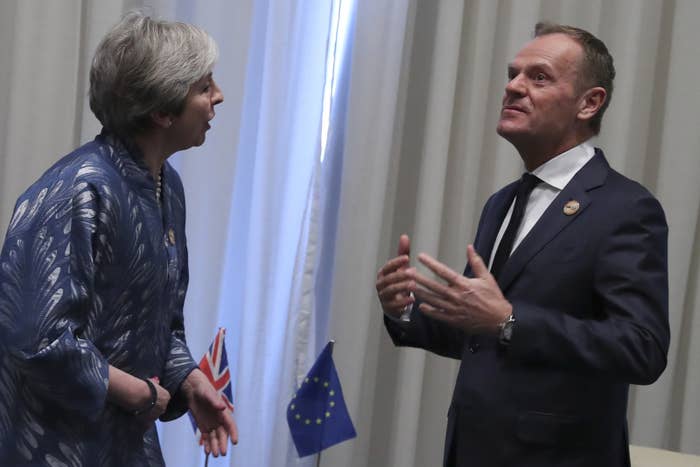
The EU’s remaining 27 member states will consider two proposals this week for delaying Brexit that would require the UK to either pass a withdrawal deal by this Friday or face a long extension with strict conditions attached to ensure Britain doesn’t disrupt the bloc’s working.
A memo seen by BuzzFeed News sets out the bloc’s current thinking and draft terms to extend Article 50 — the framework that sets out the two-year process for the UK’s departure from the EU that was due to end last month — ahead of Wednesday’s European Council summit of EU leaders.
Its content will be discussed first on Tuesday by EU27 ambassadors and sherpas who are preparing draft conclusions for this week’s meeting, and is still subject to change. The final decision will be made by the leaders on Wednesday.
It lays out two scenarios for an extension. In the first, Brexit would be delayed until May 22 if MPs approve a withdrawal agreement before this Friday, April 12 — the date currently scheduled for Britain’s departure from the EU. The additional time would allow for ratification of the agreement.
But that is highly unlikely given the current state of play at Westminster. The memo says that if a withdrawal agreement is not passed by Friday, the 27 leaders will be asked to consider a 9- or 12-month extension, until Dec. 31, 2019, or March 31, 2020. The purpose of the additional time, the memo says, would be to give the UK the space it needs to complete its domestic decision-making process and find a majority for a deal.
The memo also includes proposals to prevent the UK from disrupting the EU’s working, for example by holding up budget negotiations. It notes that as a withdrawing member state, the UK will have an enhanced duty of “sincere cooperation”, and suggests that the EU will have the right to end the extension period, in agreement with the UK, in the event of noncompliance with this duty.
European member states are privately concerned about the prospect of a hardline Brexiteer such as Boris Johnson becoming prime minister and threatening to frustrate key decisions and veto important measures.
Last week, Tory Brexiteer Jacob Rees-Mogg tweeted that the UK should be "as difficult as possible" in the event of a long extension.
If a long extension leaves us stuck in the EU we should be as difficult as possible. We could veto any increase in the budget, obstruct the putative EU army and block Mr Macron’s integrationist schemes.
Under the same clause, the UK would be able to terminate the extension early if and when a withdrawal agreement is ratified by the House of Commons.
The 27 member states will also reserve the right to meet informally at all levels without the UK even though it will remain a full member state during the extension period.
Alongside expressing concern for Britain’s failure to pass the deal and frustration from not being able to move on from Brexit, the leaders will be asked to note May’s commitment to holding European parliamentary elections.
Senior European government sources have told BuzzFeed News that the debate among leaders will ultimately be between those who prefer a short delay versus those who would rather see a long one.
The chances of a no deal on 13/04 are extremely low. No senior EU27 govt official I have spoken to in recent days thinks it conceivable that anyone would veto an extension and push Britain over the cliff. Debate among EU27 is about short vs long extension. Views on this differ.
In a letter to European Council president Donald Tusk last week, Theresa May asked the EU for a short extension of Article 50 to June 30. It is the second time May has asked to delay Brexit.
The prime minister has been locked in talks with Labour leader Jeremy Corbyn since last week to find a way out of the impasse the UK finds itself in after the Brexit deal she negotiated with the EU was rejected three times by MPs.
In the letter, the prime minister said she was looking for a single unified approach with Labour, and if that fails, to establish a process to put a small number of clear options to the House of Commons. May acknowledged that the UK would organise European Parliament elections, and that the UK would act as a constructive and responsible member state.
According to the memo, EU leaders will be asked to make clear that the withdrawal agreement cannot be renegotiated under no circumstances. The additional time can only be used to amend the political declaration that outlines the future UK–EU relationship. Any such changes would need to be negotiated with the European Commission, and agreed upon by the 27 member states.
The leaders are also expected to note that leaving the EU on April 12 without an agreement would be entirely a UK decision, and that the UK has the right to unilaterally and unconditionally revoke Article 50 should it want to cancel Brexit.
Finally, the 27 leaders are expected to formally agree on Wednesday that, in the event of a no-deal Brexit, the EU will not enter talks with the UK unless the rights of EU citizens in the UK are protected, Britain settles its financial commitments, and a solution to the Irish border is found that complies with the Good Friday agreement while protecting the integrity of the single market.
